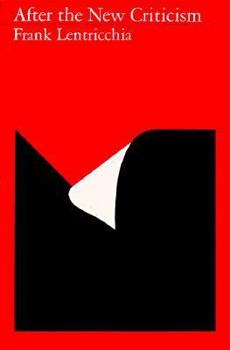After the New Criticism
Select Format
Select Condition 
Book Overview
This work is the first history and evaluation of contemporary American critical theory within its European philosophical contexts. In the first part, Frank Lentricchia analyzes the impact on our critical thought of Frye, Stevens, Kermode, Sartre, Poulet, Heidegger, Sussure, Barthes, L vi-Strauss, Derrida, and Foucault, among other, less central figures. In a second part, Lentricchia turns to four exemplary theorists on the American scene-Murray Krieger, E. D. Hirsch, Jr., Paul de Man, and Harold Bloom-and an analysis of their careers within the lineage established in part one. Lentricchia's critical intention is in evidence in his sustained attack on the more or less hidden formalist premises inherited from the New Critical fathers. Even in the name of historical consciousness, he contends, contemporary theorists have often cut literature off from social and temporal processes. By so doing he believes that they have deprived literature of its relevant values and turned the teaching of both literature and theory into a rarefied activity. All along the way, with the help of such diverse thinkers as Saussure, Barthes, Foucault, Derrida, and Bloom, Lentricchia indicates a strategy by which future critical theorists may resist the mandarin attitudes of their fathers.
Format:Paperback
Language:English
ISBN:0226471985
ISBN13:9780226471983
Release Date:July 1981
Publisher:University of Chicago Press
Length:398 Pages
Weight:1.10 lbs.
Dimensions:0.8" x 5.9" x 9.0"
Customer Reviews
1 rating
Varieties of Modern Literary Criticism
Published by Thriftbooks.com User , 27 years ago
This book represents an awesome performance of critical thinking. It traces literary discourse back to the thirties and forties, the period of the "New Criticism", which basically meant an abstracted reading of works from their original context. The new critics were in many cases formalists in that they look for internal coherence and unity rather than references to time and place. The book includes extented discussions of modern philosophies, including existentialism and phenomenology. A synopsis would show a move from myth criticism to existentialism to structuralism and concludes with deconstruction/post-structuralism,i.e. the advent of Derrida. Lentricchia is concerned throughout with showing the limitations of all these approaches and he claims that we need to find some sort of connection between life and literature. His touchstone is "History"--the way from thought to action. Alas, he hopes Foucault will show the way, but ultimately, as he admits later, he too succumbed to kind of formalism. Anyone who is curious about modern critical discourse will profit from a reading of this magnificant book





